|
|
|
Sort Order |
|
|
|
Items / Page
|
|
|
|
|
|
|
| Srl | Item |
| 1 |
ID:
127149
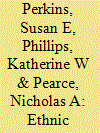

|
|
|
| 2 |
ID:
127824
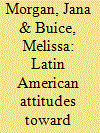

|
|
|
|
|
| Publication |
2013.
|
| Summary/Abstract |
This article outlines three theoretical arguments-socialization, status discontent, and elite cues-that generate competing predictions about the way context shapes gender attitudes. Using hierarchical analysis, we assess the power of these arguments in Latin America, a region that manifests considerable variation on our central explanatory variables and thus offers important theoretical leverage. We find men's gender attitudes to be highly contingent on elite cues and susceptible to backlash effects in response to women's economic advancement. Also, where women lack national representation, distrust of government promotes support for female leadership as an alternative to the discredited (male) establishment. The analysis supports existing individual-level explanations of gender attitudes and demonstrates a connection between diffuse democratic values and gender egalitarianism. The findings suggest that recent advances for female politicians in Latin America may be susceptible to reversal, and they illuminate strategies for strengthening women's equality in the region.
|
|
|
|
|
|
|
|
|
|
|
|
|
|
|
|
| 3 |
ID:
120882
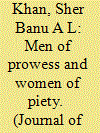

|
|
|
|
|
| Publication |
2013.
|
| Summary/Abstract |
Studies on leadership in Southeast Asia's early modern era have tended to centre necessarily on men, and in particular, on O.W. Wolters' concept of 'men of prowess'. The concept of female leadership is still little researched. This case study of Sultanah Safiatuddin Syah of Aceh (1641-75) provides some insights into female leadership in the Malay-Muslim island world of Southeast Asia. Contrary to the received view that successful leadership tended to be male (men of prowess), this article demonstrates that female leadership and the justification for the position of the ruler relied less on notions of sacral and charismatic power based on male prowess, but instead shifted to Muslim notions of piety and the just ruler.
|
|
|
|
|
|
|
|
|
|
|
|
|
|
|
|
| 4 |
ID:
145454
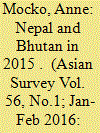

|
|
|
|
|
| Summary/Abstract |
Nepal faced massive earthquakes, which killed, displaced, or traumatized thousands of people, but it also ratified a new constitution and elected its first female head of state. Bhutan celebrated the legacy of King Jigme Singye Wangchuck, made advances in its hydropower infrastructure, and strengthened political relationships with its neighbors.
|
|
|
|
|
|
|
|
|
|
|
|
|
|
|
|
| 5 |
ID:
108401
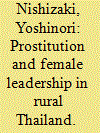

|
|
|
|
|
| Publication |
2011.
|
| Summary/Abstract |
For all the attention paid to the economic, social, and moral dimensions of prostitution in Thailand, no scholar has thus far conducted an empirical study of the relationship between the vice and political change in the countryside, where most sex workers come from. Using the case of Phayao Province in northern Thailand, I attempt to redress this lacuna. I show how rampant prostitution, the most acute social issue in Phayao, has ushered in the rise to power of one virtuous woman from an ethnic minority family-Ladawan Wongsriwong. Located on the economic and social margins of Thailand, many village families in Phayao traditionally relied on prostitution for income, causing a massive influx of young girls into the lucrative sex industry in Bangkok and abroad. In the 1990s, however, AIDS started taking a heavy toll on Phayao's small population. Against this backdrop, Ladawan emerged as a prominent female leader in the male-dominant rural society of Phayao by conducting an extensive issue-oriented campaign against prostitution. This case questions much of the literature on rural politics and female leadership in democratizing Southeast Asia that underestimates the importance of social issues.
|
|
|
|
|
|
|
|
|
|
|
|
|
|
|
|
|
|
|
|
|